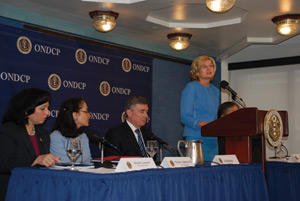Advocacy
Why We Advocate
NOPE is no stranger to fighting for legislation that reduces our nation's drug abuse problems.
At the entrance to the NOPE office in West Palm Beach, Fla. is a wall filled with faces of those who died of drug overdoses, many looking forever happy in photos taken when long life seemed so certain. These faces motivate NOPE Task Force to advocate for meaningful reforms at the state and federal levels in combating the proliferation of illegal drugs and the unlawful distribution of powerful prescription pills.
NOPE brings its message to both public and private forums in order to focus attention on this epidemic and to put a human face on the debate. We believe young people cannot die from drug overdoses if they do not have access to drugs.

How to Contact Your Legislators and Build Relationships
Building Relationships
Relationship building is very important, if not the most important part of advocacy in politics. Maintain rapport with your Legislators by sending them a quick email or phone call. This relationship will keep your issue on the forefront of their mind.
Know your legislators
Visit their website prior to your meeting to find out their background, committee assignments and voting record.
Visit your legislators
Invite legislators to your office when they are in your town. Visit their office when you are in town.
Dress professionally
Business attire is always appropriate.
Introduce yourself
Give the legislator your contact information and most importantly identify yourself as a constituent.
Stay focused
You will probably only have a few moments to talk with your Legislator. Prepare for the conversation by determining which two or three key points that you want to convey.
Have talking points
Be prepared with a few talking points about the issues you plan to discuss. Familiarize yourself with these points prior to your meeting. If a Legislator has a question you can't answer, it's okay to say you don't know.
Share a personal story
Personal stories and human emotions can make larger impressions on a Legislator than any fact or figure. Let the Legislator know how the issue has effected you personally and how the proposed Legislation could have changed your situation.
Offer your support
Make it clear you are available to help them out. Give examples of the people you serve. Bring along information about what you do. Make sure you include your contact information.
Be polite
It's important to stay calm and convey your points without becoming negative. You may disagree with a Legislator on one issue but agree later on another. Always keep in mind that relationships matter!
Develop a relationship with the staff
When calling or visiting the legislator's office, develop a relationship with the staff. Typically, the Legislative Aides are the ones researching the issues, writing the legislation and have the contacts. They are the gatekeeper between you and the Legislator and are instrumental in getting your legislation passed.
Follow-up Thank You Note
As previously mentioned, positive, long-term relationships are necessary for advocacy. A great way to maintain your relationship is by writing a hand written thank you note to show your appreciation for their work.
Tips for Sending Letters and Emails to Your Legislators
You do not need to be an expert in legislative advocacy
Make contact with your legislator as a concerned parent and voter about an issue important to you.
Thank your legislators
Although you might not agree with your Legislators stance on an issue, they are more likely to listen to you and your idea if they understand that you appreciate them and the work they do for your community. Begin the letter by thanking them for their past support or for their commitment to public service.
Tell your story
Personal stories and human emotions can make larger impressions on a Legislator than any fact or figure. Let the Legislator know how the issue has effected you personally and how the proposed Legislation could have changed your situation. After explaining your circumstances, ask for an action that you want your legislature to take. Always be positive, courteous and thank them for their support.
Use your own words
Personal letters are more effective than formal letters. Use your own words to express your message and emotion.
Send an email
Compose your email as if it were a personal letter.
When writing your letter:
- Use the correct address and salutation
- Describe the Bill by popular name and by house or senate file number
- Write about one issue per letter
- Letters should be no longer than one page
- Provide examples about how the issue affects your district
- Know your facts, inaccurate information will hurt your credibility
- Use your own words and stationary rather than form letters
- Offer alternative solutions to the problem
- Send a thank you note if your elected official supports your issue
- Identify yourself as a constituent by including your name, address, phone number and email address
Find Your Legislators
Click here to find your Federal, State and Local Legislators